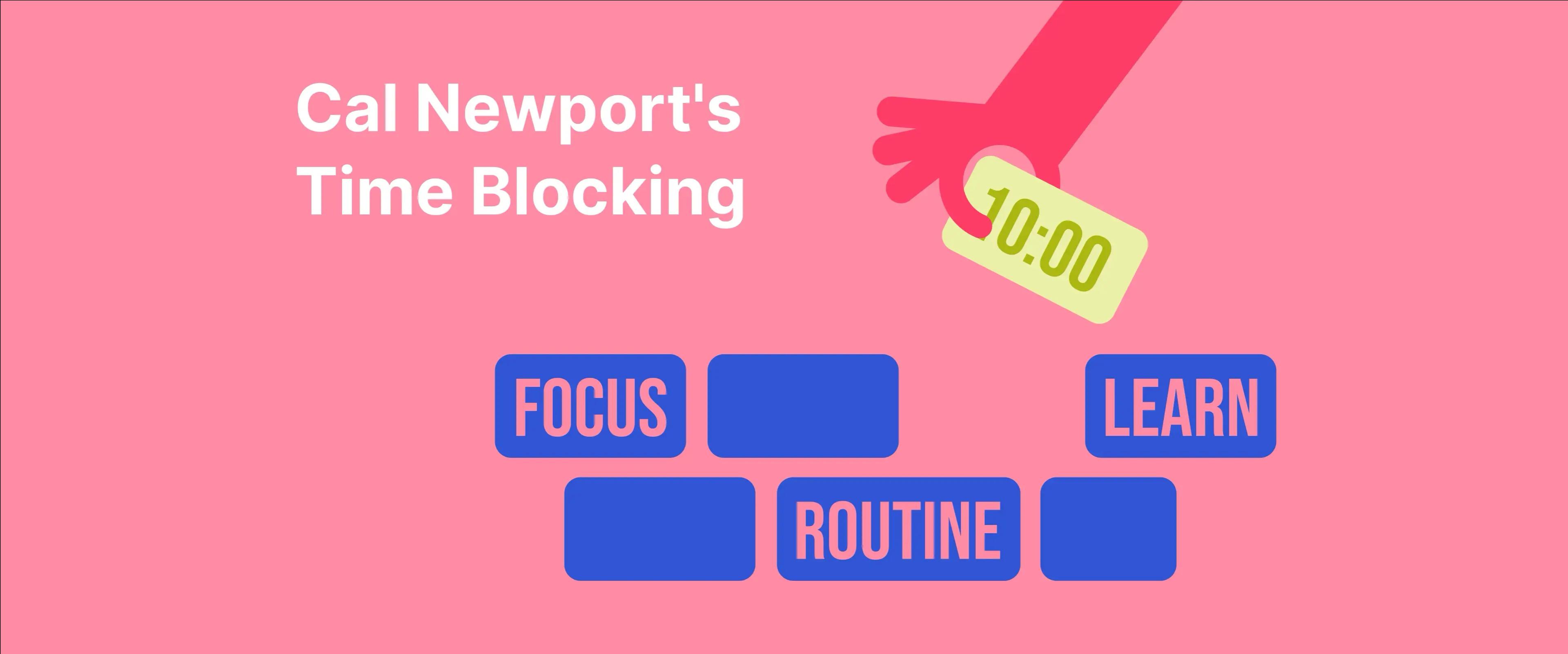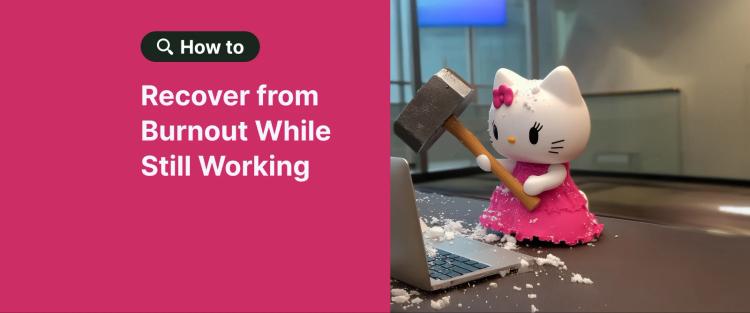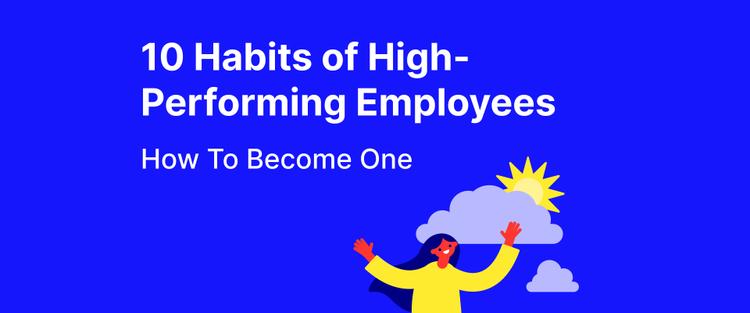Do you often feel that life is rushing by, you don't have time for anything, there are more and more things to do, and usually you just want to run away somewhere from the list of tasks that have piled up? How do you manage to successfully and concentratedly complete work tasks without distractions? How do you balance your work and personal life? If you ask yourself these questions, this article is for you today!
Time blocking (or time boxing) is one of the most effective time management techniques created by Cal Newport, author of 'Deep Work.' Elon Musk, Cal Newport, and Nir Eyal appreciated the benefits of time-blocking. This technique involves dividing the day into time blocks, and each block is allocated to a specific task or business. Newport said that if you do not make a schedule for yourself, time is often wasted on unnecessary trifles or is wasted altogether.
In this article, you’ll learn:
How time blocking works
Why it’s more effective than to-do lists
How to start using Newport’s planner
The role of deep work and digital minimalism in mastering your time
What is Cal Newport's time-blocking method?
A well-known idea from Cal Newport is the time-blocking daily schedule. This effective time management technique helps structure your workday, avoid procrastination, and increase productivity. According to it, you plan your next day, starting in the morning and ending in the late evening, by creating blocks for all your activities.

How time-blocking works (with examples)
This strategy or planning system is quite simple but, at the same time, convincing. When there are many things to do, the question of what to do first and what to do next can often arise, causing tension and stress. Time blocking is a ready-made plan of what to do at what time. It protects your time from chaos and urgent trifles because time is allocated for essential things in the schedule, which helps you work focused. It allows you to assess how long something takes realistically, giving you more time. This way of organizing time increases productivity without exhaustion.
There is an example of time-blocking for a person with kids and remote work. You can create your own blocks, according to your needs, and balance work tasks and personal time, which will help you have a measured rhythm in life.
06:30–07:30 – Morning time for yourself
07:30–08:30 – Breakfast with family, help kids with morning routine
08:30–09:00 – Road / logistics / quick cleaning
09:00–11:00 – Deep work (content, projects)
11:00–11:30 – Break
11:30–13:00 – Light work (editing, e-mail, organization)
13:00–14:00 – Lunch
14:00–15:00 – Meetings, calls, quick tasks
15:00–17:00 – Housework / shopping / cooking
17:00–18:00 – Personal projects
18:00–20:00 – Family evening + dinner together
20:00–21:00 – My things: shower, series, or other content
21:00–22:00 – Quiet evening with a partner or a book
22:00 – Sleep
Why time-blocking increases productivity
"If you service low-impact activities, therefore, you're taking away time you could be spending on higher-impact activities. It's a zero-sum game." ― Cal Newport, 'Deep Work'
The amount of time you block for a task relates to your ability to focus and engage deeply with the work. If you set aside one or two hours for a specific type of work or study material, you should be able to complete it thoroughly in that time block and then move on to another activity as planned.
In 'Deep Work,' Cal Newport offers a strategy for achieving peak productivity in the age of digital distractions and increasing the time available for deep, meaningful work.

Deep work scheduling sets aside specific times for intense, uninterrupted work.
Create a schedule for deep work sessions with specific times or days.
Choose a quiet, private space free from distractions.
Set clear goals for each deep work session.
Tell your colleagues you will be on a "do not disturb" schedule during these sessions.
Maximize your ability to focus and think creatively.
Practice being alone with your thoughts, free from gadgets and distractions.
Set daily time limits on your use of entertainment content.
Complete challenging tasks without stopping to check messages or social media.
Use wait times (in line, in traffic) to reflect, not to scroll through your news feed.
A social media detox will help you assess the impact of social media on your productivity.
Conduct a 30-day social media reflection experiment.
Analyze which platforms are genuinely beneficial to your work and personal development.
Set clear rules for using social media, like only during specific times
Consider delegating management of work-related social media.
Free up time and mental resources for more productive activities.
Minimize time spent on superficial activities.
Identify "shallow" tasks in your workday (e.g., answering routine emails).
Group similar small tasks together and complete them at designated times.
Reduce the length of meetings by setting clear goals and agendas.
Automate or delegate routine tasks where possible.
Tailoring these principles to fit your unique work style and personal preferences is essential. Try experimenting with various approaches to discover the best balance between focused, deep work and the necessity of being available to your team when urgent issues arise.
Time blocking vs. To-do lists and GDT
Another well-known GTD (Getting Things Done) system by David Allen creates a nice list system. However, it does not address the primary challenge of time management: ensuring that you allocate enough time for all essential tasks without experiencing burnout.
When exactly should it be done? Time blocking forces you to assign time to each task, turning intentions into actions. You'll learn to estimate how much time you need to allocate to answer emails, make a call with a colleague, write a text, or shoot a video. And you'll never get distracted by social media or the lure of a nap because you designate a block for rest.
Cal Newport's time-block daily planner: What’s inside
"To build your working life around the experience of flow produced by deep work is a proven path to deep satisfaction."―Cal Newport, 'Deep Work'
Cal Newport, a productivity expert and best-selling author of 'Digital Minimalism,' created a planner you can buy on Amazon. In it, he shares his planning experience and teaches you how to use the time-blocking strategy he has used for fifteen years. He spends about 20 minutes at the end of the day preparing for the next day.
The time-block planner makes it easier for you to prioritize tasks and focus on the things that matter. Using the time-blocking method, you'll no longer be distracted by your inbox, social media, and other people's demands.
The structure of the planner
You'll find instructions on how to use the planner and an explanation of time-blocking on the first pages. The planner consists of bold templates and weekly plans with spaces for each day. The daily planning pages offer ideas and blocks to divide each day into hours, with two lines for each hour. Newport shows you can change your plans during the day by revising the blocks. He even added an inspirational quote on each page.
On the top of each daily page is a space to reflect on your deep work hours and other metrics for creating valuable habits. Newport proposes a shutdown ritual to end the work day. Weekends have smaller places for blocks. You can even plan your vacations to avoid procrastination and missing out on fun.
Digital minimalism: Rethinking your relationship with time & tech
"Solitude Deprivation is a state in which you spend close to zero time alone with your own thoughts and free from input from other minds." ― Cal Newport, 'Digital Minimalism'
To have time to complete everything in your block planning, you must reduce the impact of many distracting online things that steal your time and attention.
You keep your phone on the table when you're out at a café. You check it at home, during lectures, at work — almost without thinking. What began as a helpful tool has quietly become a constant presence that demands your attention. It might sound a little dramatic, but think about it. Your phone now has a say in how you spend your time, how you feel throughout the day, and even how and where your money goes.
In 'Digital Minimalism,' Cal Newport teaches how to change your relationship with modern technologies so that they work for your good and do not control your life. He offers several vital ideas about finding a reasonable balance between online and real life.

Eliminate distractions
Notifications on your smartphone, emails, unnecessary information, and colleagues who are constantly talking can distract you from your work. There are various ways to maintain focus, such as putting your phone away and turning off social media notifications, blocking distracting websites, or even locking the door. Do everything you can to focus on your work. Check your email or social media during a short break.
Cal Newport describes digital minimalism in three main principles:
1. Clutter can be costly. It is important to avoid overwhelming your time and attention with too many devices, apps, and services. Your small benefits will fade away if you don't minimize this clutter.
2. Optimization is key. To make the most of your technology, consider how and why you use it and strive to optimize your usage.
3. Embracing digital minimalism allows you to take pleasure in intentionally engaging with new technology.
When communicating with brilliant minds, Newport initially contemplated the level of concentration needed to tackle complex tasks. One paradox he uncovered was the skepticism of digital geniuses toward digital technologies.
Follow through on your leisure plans
"Running is cheaper than therapy." ― Cal Newport, 'Digital Minimalism'
You should plan your free time just as carefully as your work time in time-blocking. Newport suggests setting quarterly and weekly schedules for your leisure activities. Like any goal, these should be specific and measurable. Additionally, identify the habits you need to develop to help you achieve these plans. Every week, take the time to determine what actions you can take to reach your quarterly objectives and incorporate those actions into your weekly planning. By approaching your leisure time more purposefully than spontaneously, you will realize that leisure is a significant part of your life.
Who is Cal Newport?
Cal Newport is the author of eight books, two of which are New York Times bestsellers, and a computer science associate professor at Georgetown University. In 2007, Newport started the blog 'Study Hacks,' where he writes about achieving productive, valuable, and meaningful work in the digital age. He created the term deep work, which refers to focused work or study for extended periods without the distractions of email and social media.
In 2016, Cal Newport published 'Deep Work,' which claims that our ability to focus without distraction is becoming rarer (primarily due to technology) while at the same time becoming increasingly valuable in a distracted world (as the knowledge economy becomes increasingly cognitively demanding).
As a result, those people and organizations that develop their ability to do deep work will have a significant competitive advantage. According to the World Economic Forum, focus and analytical thinking are top skills. 'Deep Work' became a New York Times bestseller, selling over 1.5 million copies. In 2017, Newport began promoting digital minimalism and published his second bestseller, 'Digital Minimalism'.
'Deep Questions with Cal Newport' podcast
In his blog, Newport discusses his effective time management practices, which include time blocking, daily hourly planning, productivity techniques, deep work, digital minimalism, and cultivating a purposeful life.
Newport answers listeners' questions in the Deep Dive section of his podcast, where he profoundly considers a single idea or problem. He addresses topics such as "Why am I always distracted?" or "Deep habits," adding humor and creativity with input like "Would Kant use TikTok?" or "Jane Austen's To-Do List."
Manage your time masterfully with the Headway app
Time is a valuable resource you cannot earn or save, but you can learn to use it correctly. Download the Headway app to find the best book summaries on habits and minimalism. Why minimalism, you ask? Spend your time on what is essential and valuable, and discard what is unnecessary. Focusing on fewer tasks will make you more efficient than wasting energy on many things and activities that scatter your attention. This is the main idea of Cal Newport's books.
If you want to grow and get valuable ideas every day, go to the quiz in the Headway app, which will help you customize the summary suggestions according to your interests. You will receive recommendations for book summaries that are right for you and your needs. Just 15 minutes, and you have the key ideas of the book. Invest in your development with Headway!
FAQ
What is Cal Newport’s time blocking method?
Time blocking is a planning method for reserving time for specific tasks. It involves dividing the day into time blocks, each designed to complete a particular group of tasks or one crucial task.
Is time blocking suitable for people with unpredictable schedules?
Time blocking is just a tool. Life is unpredictable, and plans can and should change. When an urgent task arises, you can review the schedule, move blocks, or shorten them.
What tools can assist with implementing time blocking
You can use an electronic calendar (Google Calendar, LeaderTask), distraction blocker apps, a timer, or a paper planner (as Cal Newport proposes)- whatever you like best.
Can time blocking help reduce burnout?
Planning your time in blocks lets you start immediately and be more efficient. Having a planned time for rest is also helpful. Writing things down in blocks eliminates background anxiety. You will do better if you focus on only one thing at a time.
How does time blocking differ from using a traditional to-do list?
Time blocking differs from to-do lists in that you allocate a certain amount of time to each task. It's more efficient because you can see exactly what you'll have time for and have a clear plan with essential tasks for the day.
How to minimize procrastination?
Time block planning helps you focus on specific tasks by setting pre-set time intervals. Instead of a disorganized to-do list, you block out time for daily tasks, avoiding distractions.
How to focus on your primary goals rather than on small, routine tasks?
The block schedule method allows you to highlight priority tasks on your Google calendar. High-priority tasks that require maximum concentration are always listed first on your schedule.
How to create a balance between work and personal life?
Daily planning helps you allocate time for professional life, leisure, family, and personal activities. The schedule includes work tasks and personal activities, which helps avoid burnout.







